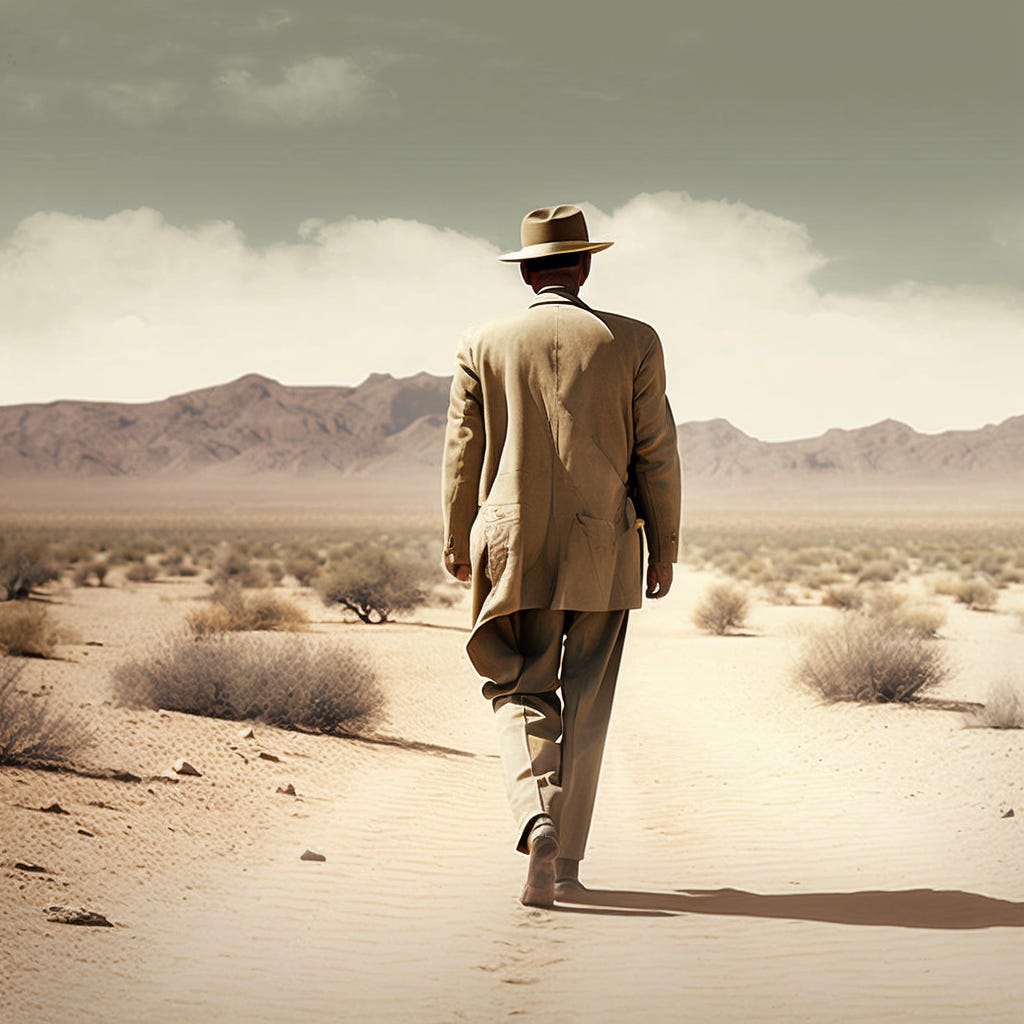On the morning of August 7, 1945, Robert Oppenheimer wandered outside the gate at Los Alamos, where he had lived and worked for two years developing the atomic bomb.
As his shoes kicked up the fine New Mexico dust, he imagined yesterday’s horror at Hiroshima, superimposing over the city the hellish inferno he and his fellow scientists had made at the Trinity test site the previous month. Thousands upon thousands of human beings vaporized; those deaths scorched his conscience. Women, children, fathers, mothers—all dead because of the weapon he shepherded into reality.
Without me, there would be no atomic bomb.
He had created the bomb but did not choose the target: a city. He championed the project with his intellect and energy because he wanted to beat the Germans in the race to turn atoms into weapons, but the Allies defeated Germany before they completed the A-bomb.
Did we need the bomb once Hitler was gone?
Roosevelt had assured him that dropping an atomic bomb on civilians in Japan would hasten the end of the Pacific war, saving more lives than it claimed, but that equation did not balance in his mind now that tens of thousands—maybe more—were gone.
How could anyone know what would or would not become history? He and his colleagues had been certain that the A-bomb would unleash tremendous energy. But annihilating innocents in the hope of saving even more people was far from certain.
I am a party to mass murder.
Oppenheimer wandered for hours, losing sight of Los Alamos. Thirsty, hungry, dirty, worn, and drained, he followed the sun until he came to a rust-colored mesa looming above the cacti and flat desert landscape. Oppenheimer wondered what it looked like eons ago before wind and sand had carved it.
He shrugged and continued walking.
Oppenheimer spotted a bicycle leaning against a saguaro cactus on the mesa's far side. Not a random bike, but his bicycle—his Durkopp Gents Chainless bicycle with its brown leather seat and white-walled tires. A dyed green rabbit’s foot dangled from the seat, and his name was etched onto the top tube—just like the bike he had when he was fifteen.
This is my bicycle. In the middle of the desert, the bike my parents gave me for my birthday. How is my bike here?
Oppenheimer remembered that when he was eighteen he crashed into an iron fire hydrant on Thirty Fifth Street and Second Avenue, mangling his Durkopp beyond repair.
And yet, here it is, intact. As if it’s traveled in time.
As if it’s traveled in time.
Did Trinity tear a hole through time? Is this possible? No, the light, dehydration, and my emotions are playing tricks with my mind. I’m hallucinating.
Hallucination or not, Oppenheimer mounted his bicycle, raising an eyebrow to the fully inflated tires. When he owned it, he had to fill the tires with air before every ride and sometimes even during a ride.
He ran his fingers along the bike’s metal tubing, the cold steel chilling his fingertips. A blue, red, and green aurora surrounded his hand, traveled up his arm, and around to the other, making him giddy, as if he’d had several glasses of wine.
Oppenheimer leaned over and pinched the front tire; it was tight and rigid, the air inside holding fast.
Let’s ride!
In the distance was a piper’s melody. The sun hovered just above the horizon, glowing redder but not setting, warming him as he got closer, a phenomenon he knew wasn’t possible. The more he biked, the brighter the sun became until the light blinded him to the surrounding desert.
Still, Oppenheimer pedaled forward, his legs weary, but his perseverance undaunted, just like nothing had stopped him from building the atomic bomb.
When the light faded, Robert Oppenheimer found himself in New York City, his home for many years.
How have I biked thousands of miles?
The cars were different, gruff, and louder than they should’ve been, and they were all antiques, boxy, big, boisterous. Horses clip-clopped everywhere while men and women dressed in clothing that belonged in a Hollywood wardrobe closet, not New York, shuffled every which way. They stared at him with cautious eyes.
Something’s wrong with the city. I am…
Oppenheimer dismounted his bike, letting it fall to the cobblestone. He ran left, right, downtown, and uptown until he found what he was searching for: a store selling newspapers.
Today is April 22, 1919.
The significance of that date hit Oppenheimer almost like an atomic explosion itself. Today was his fifteenth birthday, the day his parents gave him this bicycle.
Why am I here? Oppenheimer asked New York’s skyscrapers, though he knew the answer.
As he emptied his mind, spilling into the ether the equations and theories that made him the great physicist that he was, would be, and would now never be, Oppenheimer walked north along Second Avenue until he spotted a boy with jet-black hair on his Durkopp Gents Chainless bicycle, his speed increasing like the neutrons in an atomic chain reaction, feet and pedals a blur, smiling wider with each revolution.
When the boy passed by Oppenheimer, he whipped his arm out and pushed him into a passing car.
Oppenheimer vanished.
One hundred twenty-five years later, in the year 2064
The president’s expression was somber, her tone low and soft, barely louder than a whisper. Despite the room’s air conditioning, beads of sweat dotted her forehead. She addressed her national security advisor, who was sitting on the couch in front of the Resolute Desk. “You’re saying that a rocket with—what do you call it?—an atomic explosive can destroy this asteroid.”
“Yes, Madam President. But there’s a problem. Although our scientists say that an A-bomb can obliterate the asteroid before it impacts Earth, and we have the rockets to reach the asteroid, it will take a year to build a bomb.”
“And the asteroid—?”
“Will strike Earth in three months, extinguishing all life.”
If you enjoyed Oppenheimer’s Bicycle, I think you’ll also like Stories Not Yet Told.






You told his story better in a couple of minutes than Christopher Nolan did in a couple of hours.
Now this is one heck of a story. I love how your mind works, Bill. The time travel element is so much fun and so creatively executed!